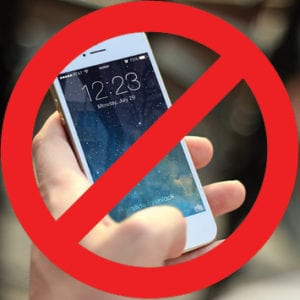 Jews across the country, myself included, and others from different faiths took a pledge on Friday, March 3-4, to unplug.
Jews across the country, myself included, and others from different faiths took a pledge on Friday, March 3-4, to unplug.
National Day of Unplugging, a 24-hour period of commitment, has its origins in the Sabbath Manifesto, a creative project produced to meet the collective need to fight back against the increasingly fast-paced way of living.
Conceived by Reboot, a network of leaders who work toward a common goal to “reboot” the culture, rituals and traditions of Judaism, the day offers a chance for people of every color, faith and creed to slow down and reconnect with friends, family, the community and themselves.
This is done simply (or not so simply) by avoiding technology, connecting with loved ones, nurturing your health, getting outside, avoiding commerce, lighting candles, drinking wine, eating bread, finding silence and giving back.
What could be easier, right?
My National Day of Unplugging started at the home of Benji and Lisa Berlow, who hosted a Mexican-themed First Friday Shabbat. They asked their guests to fill out a pledge card to unplug with a “purpose.” For examples, disconnect from the stress of work, spend more time with family and less time on the internet, take time to reflect on the week just completed and to contemplate goals for the week ahead.
I encountered my first unplugged pang as I watched the Shabbat candles being lit. I wondered why there are two instead of three, or even eight as on Chanukah, and why a woman traditionally lights them. I tried to recall the answers from memory since my pledge to unplug denied me the instant gratification of googling the answers.
I did just that at the end of the day, but more on that later.
To be sure, we live in a hectic nation. Approximately 30 percent of the adult population in North America has an anxiety disorder. These disorders affect 18.1 percent of adults in the United States (approximately 40 million adults between the ages of 18 to 54), according to the National Institute of Mental Health (NIMH). Also, 65 percent of North Americans take prescription medications daily, 43 percent take mood altering prescriptions regularly.
Anxiety is expensive. According to The Economic Burden of Anxiety Disorders, a study commissioned by the Anxiety and Depression Association of America, such disorders cost the nation more than $42 billion a year, almost one third of the $148 billion total mental health bill for the United States.
A poll by Deseret News found that half of all American adults today (50 percent) say Shabbat has personal spiritual meaning for them, down from 74 percent in 1978. However, 62 percent agree that it’s important for society to have one day a week set aside for spiritual rest.
More than nine in 10 Jews believe that a person can be Jewish and still work on the Sabbath, according to a 2013 survey of American Jews from Pew Research Center.
While there is no detailed study on the mental health benefits of keeping the Shabbat, every study that has been done has shown an overwhelmingly positive response to observing it.
Dr. Mehmet Oz of The Dr. Oz Show has aired an episode called “The 7th Day Restart Plan,” which encouraged viewers to go outdoors and spend time in nature. “When we put patients into nature after procedures,” said Oz, a professor of surgery at Columbia University College of Physicians and Surgeons, “they actually recover faster.”
While the nation’s overall mental health may look dim, National Unplugged Day, and similar efforts, can brighten its outlook. When the 24 hours were up, I googled the significance of candles in Judaism and found that candles represent the human soul. Like the soul, they must breathe, change, grow and strive against the darkness.
Ultimately, they also fade away.
I also learned that women light the Shabbat candles because women set the foundation for every Jewish home.
Traditionally, their primary task is to ensure that each domicile is a haven of light, peace and harmony, suffused with an atmosphere conducive for spirituality. Shabbat reminds us, just like International Women’s Day on March 8, to honor the role women have in the family and in society.
The flickering of candle lights remind us of the fragility of our lives. Life must be embraced and cherished at all times. Lighting two candles has great significance in explaining why observing Shabbat has been surely one of the oldest traditions in Judaism, I leave it to you to find the answer.


